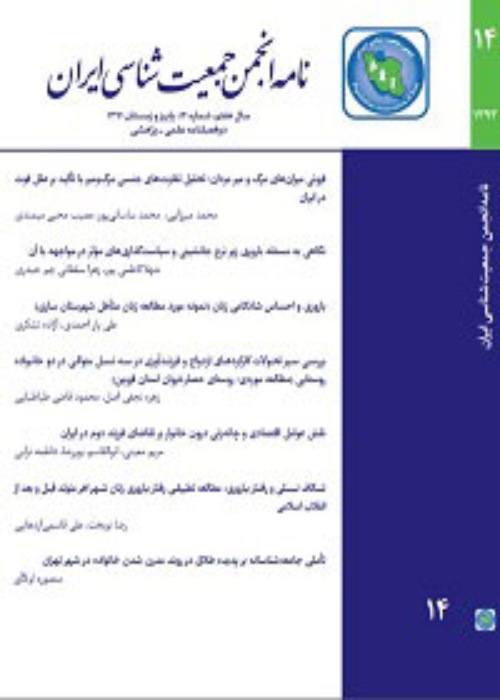Attitudes Toward Spouse Selection Among Female Students and Its Correlates
The aim of the study was investigating the factors affecting the attitude towards spouse selection among female students at University of Tehran. The data were collected through a survey using researcher-designed questionnaire. The statistical population comprised female students from various faculties at University of Tehran, across undergraduate, master's and doctoral levels. The sample size was determined to be 400 individuals using Cochran's formula, and the sampling method employed was simple stratified random sampling. The findings showed that the desire to friendship between boys and girls and the extent of social networks usage are the strongest predictors of attitude towards spouse choice among students. Subsequently, factors such as family engagement, aspiration for gender equality, educational background, and age were also play a crucial role. The study suggests enhancing self-awareness and decision-making skills to youth, and to train families to understand the needs of the younger generation, thereby bridging the generational gap. Emphasizing their agency, responsibility, and selectiveness is also recommended. Furthermore, reforming spouse selection patterns can strengthen family foundations, increase childbearing desire, and improve the national demographic trends, as any rise in fertility and childbearing in Iran occurs within the family context.
The institution of marriage has undergone significant changes in recent decades, and the way of spouse selection have evolved accordingly. This research aims to examine the factors influencing young people's attitudes toward choosing a spouse. Understanding these factors is crucial for facilitating a more appropriate spouse selection process, particularly in Iranian society where childbearing occurs within the marital framework. Therefore, family stability is also a necessary prerequisite for childbearing, making the examination of spouse selection methods key to successful marriages and life stability. Awareness of these factors is valuable for professionals in spouse selection training or marriage counseling, as well as for strengthen family foundations, increase childbearing desire, and improve the national demographic trends.
The current study focuses on the factors influencing spouse selection attitudes among female students at the University of Tehran. Data were gathered through a survey using a researcher-designed questionnaire, targeting female students across various faculties and academic levels. A sample size of 400 was determined using Cochran's formula, with stratified random sampling method. This cross-sectional survey is applied research aimed at collecting data through structured questionnaires in 2018. The reliability of the Likert scale items was verified using Cronbach's alpha.
The study examines the relationship between independent variables (age, education, gender equality, family interaction, friendships, and social media use) and the dependent variable (attitude toward spouse selection). The Pearson correlation coefficient confirmed significant relationships between all independent variables and the dependent variable. Multiple linear regression analysis was utilized to assess the combined impact of these variables.
The analysis revealed that friendships and social media use are the strongest predictors of spouse selection attitudes, followed by family interaction, gender equality, education, and age. The findings suggest that as female students age and their education and social media use increase, so does their modern attitude toward spouse selection and autonomy in choosing a spouse. Conversely, increased family interaction correlates with decreased autonomy. Collectively, these variables account for 58% of the variance in spouse selection attitudes.
In summary, the research findings revealed that:The higher the level of social media usage, the greater the individual's inclination toward autonomy in spouse selection.
Individuals with less family interaction tend to have a stronger inclination toward autonomy in choosing a spouse.
The more individuals prefer friendships with boys, the more inclined they are to choose their own spouse.
A stronger inclination toward gender equality correlates with a higher preference for autonomy in spouse selection.
Individuals with higher education levels tend to have a greater inclination toward autonomy in spouse selection.
The study identified key factors influencing spouse selection among female students, highlighting the role of social media, family interaction, friendships, gender equality, and education level in determining autonomy in spouse selection. Educating young adults about these factors can improve their decision-making regarding marriage. Universities are strategically positioned to offer educational programs on decision-making, spouse selection, and marriage readiness. Given that fertility and parenting in Iranian society are contingent upon marriage, informed spouse selection is pivotal for family stability and increased fertility.
Recommendations include providing self-awareness and decision-making training to young individuals, especially in universities, and educating families to understand and support the younger generation's desires, thereby bridging generational gaps and enhancing agency, responsibility, and autonomy. Such measures can strengthen families, encourage parenting, and improve the national demographic trends, as fertility and parenting increases in Iran occur within the family context, with marriage being a prerequisite for childbearing. Making informed choices thus contributes to family stability and, ultimately, to increased fertility.
- حق عضویت دریافتی صرف حمایت از نشریات عضو و نگهداری، تکمیل و توسعه مگیران میشود.
- پرداخت حق اشتراک و دانلود مقالات اجازه بازنشر آن در سایر رسانههای چاپی و دیجیتال را به کاربر نمیدهد.



